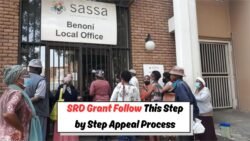Biometric Verification for SASSA Grant Holders: The South African Social Security Agency (SASSA) is making significant strides in ensuring the integrity and security of its grant distribution system. In a move aimed at curbing fraud and enhancing efficiency, SASSA grant holders are now required to complete biometric verification for their benefits, including the R2,315, R560, and R1,250 grants. This new process is designed to protect recipients and ensure that the rightful beneficiaries receive their entitlements without any undue delays or challenges. As South Africa continues to embrace technological advancements, the integration of biometric verification stands as a testament to the country’s commitment to transparency and fairness in the social welfare sector.

Understanding the Importance of Biometric Verification for SASSA Grants
Biometric verification has become a cornerstone in the fight against identity theft and fraudulent activities within government systems worldwide. In South Africa, the implementation of this technology for SASSA grants is particularly crucial given the increasing incidents of fraud that have plagued the system. By using unique biological traits such as fingerprints, facial recognition, or iris scans, biometric verification provides an additional layer of security that traditional identification methods lack. For SASSA grant holders, this means an assurance that their personal information is protected and that their benefits are safeguarded against unauthorized access. The move to biometrics is not only a proactive measure against fraud but also a step towards modernizing the grant distribution process, making it more efficient and user-friendly for all involved.
How SASSA Grant Holders Can Complete Biometric Verification
Completing biometric verification is a straightforward process that aims to minimize inconvenience to grant holders while maximizing security. SASSA has set up various verification centers across the country where beneficiaries can complete the process. Holders of the R2,315, R560, and R1,250 grants are encouraged to visit these centers with valid identification documents to undergo the biometric scanning. This typically involves capturing fingerprints and facial recognition data, which are then securely stored and linked to the individual’s grant information. It is essential for beneficiaries to comply with this requirement to ensure uninterrupted access to their benefits. SASSA has also provided mobile units in remote areas to assist those who may not have easy access to verification centers, ensuring no one is left behind in this vital process.
Benefits of Biometric Verification for SASSA Grant Beneficiaries
The introduction of biometric verification for SASSA grants brings with it a host of benefits for both the agency and the recipients. For recipients, the most immediate advantage is the reduction in fraudulent activities, which ensures that grant payments are made to the correct individuals. This not only protects the recipients’ entitlements but also fosters trust in the system. Furthermore, biometric verification streamlines the process of grant collection, reducing waiting times and eliminating the need for multiple forms of identification. On a broader scale, this technology aids SASSA in maintaining accurate records, improving overall data management, and enhancing service delivery. By embracing such innovations, SASSA is setting a precedent for a robust and reliable social security system that can adapt to future challenges.
The Future of SASSA Grant Distribution with Biometric Technology
As South Africa moves forward with biometric technology, the future of SASSA grant distribution looks promising. The successful implementation of biometric verification is expected to pave the way for further innovations in the social grant system. With enhanced security measures in place, SASSA can focus on expanding its reach and improving the quality of service to beneficiaries. This technological leap also opens avenues for integrating additional digital solutions, such as mobile applications, that can offer real-time updates and support to grant holders. Moreover, the data collected through biometric verification can provide valuable insights for policy-making and resource allocation, ensuring that the social welfare system remains responsive to the needs of the population. As these advancements unfold, the commitment to a fair, transparent, and efficient distribution of social grants will undoubtedly strengthen social cohesion and support economic development in South Africa.







